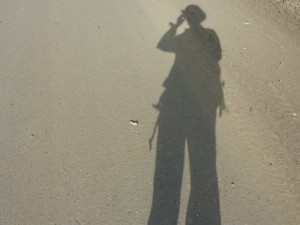PLEASE, PLEASE, PLEASE LOCK ME IN THE IVORY TOWER
Posted July 9 ’10I love doing research for my novels, especially if it involves jumping on an airplane or saddling up the car and heading out into the great unknown. A good portion of my life is spent wandering around. I love the details of other people’s lives, new subjects, thorny issues. I like the coffee makers in motel rooms and cheap bars of soap. There’s nothing better than sleeping under the stars on a warm night out in the middle of the desert—just me and my taser. I love talking to strangers about intense situations and high drama. I notice that I often adapt a slight southern drawl when ordering my breakfast at truck stops. I like to arrive in a new town, read the local paper and dive right in. There’s nothing better than jumping into the middle of a crisis, transforming myself into a character, and finding out how all the elements will impact my developing story. It’s the particulars of a situation that make the moment real for me; the way things look or taste or feel, are what allow my people to breathe and function. Usually I wear cowboy boots and jeans when I’m doing research–sometimes a big belt buckle. It helps.
But here’s the thing: I have to be a little bit careful about what I read, hear and see when I’m in the early stages of writing a book. The sponge phase, where you’re open and everything interesting or exciting or terrible or nasty or sad is a potential topic, can be a treacherous time. I have to constantly remind myself that the novel is not a giant salad. You can’t just throw in all the leftovers from the fridge and hope for a masterpiece. Watermelon, fried olives and watercress may or may not be a gastronomical delight but just because you have the ingredients on hand, doesn’t mean they should be the mainstays of your book.
True, sometimes happy-accidents occur. While I was writing my second book, The Wentworths, I happened to read Under the Banner of Heaven by Jon Krakauer. One of his best, it examines fundamentalist Mormons who still practice polygamy. I finished reading and the next thing I knew I was in the car, driving out to Colorado City, located on the Utah-Arizona border, in search of the truth about this dark religion. I was shocked and fascinated by what I saw, couldn’t get enough. In the course of writing my novel, I visited that Mecca of dysfunction seven times and ended up with a lovely character named Honey Belmont. Now in this case, I lucked out because the main theme of the book is the destructive and redemptive nature of family. Polygamy fit right in. But what if it hadn’t? Would I still have come up with an excuse to go out there? Would I have changed the novel to accommodate my curiosity? Made some sort of justification for all those road trips? Maybe. Probably. I have to be careful about what I look at when starting a book.
There was another happy accident during the writing of my most recent novel, Point Dume. The book was initially about a blue-collar community in Malibu that is slowly destroyed by the obscenely rich. I opened the book with a quote about native and invasive plant species and how invasive plants can choke out and kill off the natives. About a third of the way into that novel I found out that the Mexican drug cartels are growing marijuana in the hills of Malibu California—for real. Of course I stopped everything and threw myself into research mode. I made some contacts and spent a summer in Sequoia National Forest working on Operation LOCCUST, infiltrating cartel grow-sites, working with law enforcement to locate and destroy watering systems and breaking down the infrastructure of the camps. I had to know everything there was to know about pot farms. I flew in Black Hawk helicopters and slept in the barracks with the other guys on the mission. It was dangerous and unbelievably fun. Then I came home and smoked eight kinds of marijuana—all in the name of research. Finally I sat back down and worked the cartel activity into my novel. Would I have gone out on the marijuana mission if it did not directly fit into the theme of my novel? Absolutely. It was way too much fun to pass up. I was lucky that the subject complemented the themes of my existing work but if it hadn’t, would I have rewritten to justify my need for adventure?
And so here I am at the dawning of my next novel. I have my main themes: Migrant issues, US/Mexico border, drugs, racists. It’s going to be a gentle, light-hearted little book. I’ve got a lot of my characters up and running. We’ve cast off—Helm alee!
But here’s the problem: there’s the oil spill in the gulf. I’ve already jumped on a plane and spent a week down there checking things from Florida to Mississippi. I justified the trip by saying that perhaps my new book needs an oil spill. (It does not). The shark population of the world is being decimated and our oceans are in terrible trouble. I’ve been to Rwanda! Can’t stop thinking about Haiti. The state of education. Poverty. North Korea. The war. The President. Environmental devastation. Dangerous chicken products. Mean people. You can find a story in every topic.
I need to be forcibly restrained. There is a state of isolation where only my characters and their stories exist. The outside world doesn’t interfere; there are no distractions. I’ve been to this place before and it’s wonderful. But they keep changing the entrance and the trick is finding that secret door.




